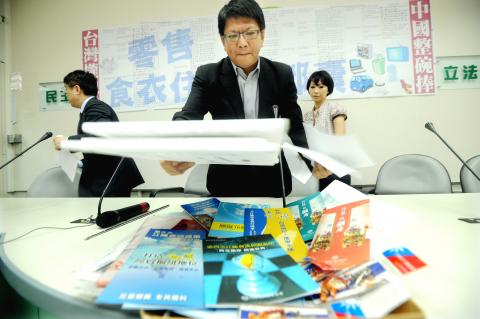|
Photographers fear pact is final nail
in coffin
By Chang Chin-ya, Chu You-ling and Jake Chung / Staff reporters,
with staff writer

Democratic Progressive Party
legislators leave a press conference in Taipei yesterday at which they urged the
government to abolish the new cross-strait service trade agreement.
Photo: Lin Cheng-kung, Taipei Times
Another trade service industry has voiced
its fears that Chinese investment will drive the majority of Taiwanese
businesses in the industry into bankruptcy following the signing of the
cross-strait trade services agreement on Friday last week.
Greater Taichung photography shop owner Shih Chih-cheng (施志承) said machines that
develop photographs digitally — with their relatively cheap cost of between NT$4
million and NT$5 million (US$ 133,000 and US$166,000) per machine — overtook the
industry a decade ago, driving about 1,000 photography stores out of business.
The stores that remain need to change their equipment, but are either unable to
afford it or do not wish to make changes, Shih said.
Chinese investors would have no compunction about spending money to obtain the
most advanced photography equipment, Shih said, adding that Taiwanese businesses
would be hard pressed to compete with Chinese firms.
Chen Kai-jung (陳凱榮), a photographer in Hsinchu County, said the industry has no
profitable future, adding that most stores stay in business by making meager
income from developing films.
Faced with Chinese investors’ potential to undercut prices, local businesses
would be unable to compete and they have no channel for government aid, as the
government has no system established to protect local businesses, Chen said.
Chen said his family have been in the photographic industry for two generations
and what little business he has is due to many years of hard work building a
reputation.
While Chinese investors might not be able to succeed by undercutting prices, it
would cause a vicious cycle of competition that would undermine the viability of
local businesses, Chen said.
Meanwhile, Chiu Hisi-hsun (邱錫訓), the owner of a wedding gown store and
director-general of the Greater Tainan Photography Association, said that should
the Chinese wedding photography industry invest in Taiwan, it would be a
disaster for local firms.
Since Taiwanese firms started investing in China a decade ago, the Chinese have
picked up on the wedding photography business, Chiu said, adding that Chinese
stores are larger in scale and size compared with Taiwanese stores.
Chiu estimated that half the Taiwanese wedding photography industry would go out
of business if Chinese investors move in.
The administration of President Ma Ying-jeou (馬英九) failed to ask the opinion of
industry representatives prior to signing the agreement, Chiu said, adding that
the government also failed to appreciate the difficulties of small and
medium-sized businesses in Taiwan.
“With the situation as it is, it is very possible that in the near future the
edge in technique and management of the Taiwanese photography industry will
gradually shift to the Chinese,” Chiu said.
Cut-priced wedding merchandise and cheap Chinese labor would also cause the
Taiwanese wedding gown industry to be severely impacted, Chiu added.
Greater Taichung Photography Association deputy director-general Yang Jih-tien
(楊日瑱) said that in the wedding photography industry, technique is the most
important asset.
Taiwanese businesses fear that Chinese investors may lure away experienced staff
with high salaries, and in tandem with price cuts Taiwanese businesses would not
last two years, Yang said.
Yang also expressed concern that Chinese investors would infringe workers’
rights by cutting wages once Chinese capital dominates the market.
Greater Kaohsiung Photography Association director-general Yang Hsien-ming (楊賢明)
said local photography shops tend to be owned by individuals instead of large
chains.
Chinese stores are different and they tend to be “straight-flush” industrial
chains, Yang Hsien-ming said, adding that he hoped the government would
prioritize Taiwanese firms when implementing policies.
A “straight flush” chain refers to a company that controls both upstream
production and downstream distribution, without having to rely on other firms.
Additional reporting by Tsai Meng-shang
and Wang Chun-chung
|
![]()
![]()
![]()